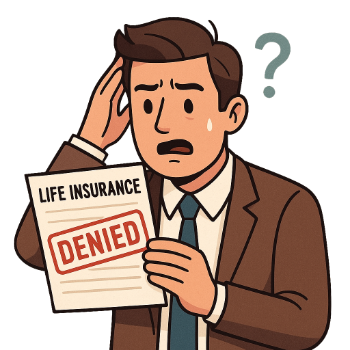Was your Life Insurance Application Declined? Don’t Give Up! Reapply Smarter!

If you have not been declined a life insurance policy, then skip this article! Speak with an agent.
Being denied life insurance isn't always the end of the road! Sometimes it is, but still have a conversation with your agent, as he or she may have different options with guaranteed issue!
Following this chart are suggestions on what to do if you have been declined.
🚫 20 Conditions That Typically Result in Life Insurance Denials
Some medical and lifestyle conditions almost always result in a decline for traditional, fully underwritten life insurance. These are considered high-risk or uninsurable due to severity or poor prognosis.
🧬 Severe Medical Diagnoses
-
Metastatic or Terminal Cancer
Especially if currently under treatment or diagnosed within the last 5 years. -
End-Stage Renal Disease (ESRD)
Especially with ongoing dialysis or transplant pending. -
Advanced Congestive Heart Failure (CHF)
Particularly Class III or IV (NYHA). -
Severe COPD (Chronic Obstructive Pulmonary Disease)
Especially if oxygen-dependent or with frequent hospitalizations. -
Organ Transplants (Recent)
Usually declined within 5 years of surgery or with any rejection history. -
ALS (Amyotrophic Lateral Sclerosis)
Typically uninsurable due to rapid progression. -
Late-Stage Liver Disease / Cirrhosis
Especially if alcohol-related or from hepatitis. -
Uncontrolled Type 1 Diabetes with Complications
Includes nerve, kidney, or vision damage. -
Recent Heart Attack or Major Stroke
Declines common within the first 6–12 months post-event. -
HIV or AIDS
Still commonly declined, though a few insurers offer niche coverage under strict conditions.
🧠 Mental Health and Behavioral Conditions
-
Recent Suicide Attempt
Especially within the last 2 years. -
Uncontrolled Schizophrenia or Bipolar Disorder
Especially if recently diagnosed or involving hospitalization. -
Cognitive Decline / Dementia / Alzheimer’s
Typically results in immediate denial.
🚬 Substance Abuse and Risky Behavior
-
Current Alcoholism or Drug Addiction
Without 2–5 years of documented recovery. -
Intravenous Drug Use
Often a lifetime red flag, even if in recovery. -
Recent Felony Convictions
Especially drug, fraud, or violent crimes within the past 5–10 years. -
No Fixed Address / Homelessness
Indicates instability and results in decline. -
Multiple DUIs or Suspended License
Especially within a 2–5 year timeframe.
🌍 Foreign Risk & Lifestyle
- Living In or Frequently Traveling to High-Risk Countries
Declines are common for travel to countries under U.S. State Department advisories.
📋 Application Red Flags
- Lying or Omitting Information
Inconsistent or false info results in automatic decline for misrepresentation.
🛑 But There’s Hope
You may still qualify for:
- Guaranteed Issue Policies (no medical questions, lower benefit)
- Employer Group Life Insurance
- Final Expense / Simplified Issue Policies
Need help navigating a decline or risk class? Reach out—we help people find the right policy, even when others say no.
What to do if you've been declined or had your policy uprated
Yes having life insurance is nice, but improving your health and life are substantially more important!
✅ 7 Steps to Take After a Life Insurance Decline or Table Rating
1️⃣ Request the Reason in Writing
-
Ask your agent why you were declined or had your policy uprated.
-
Ask when the underwriter says you should reply
-
Get the copy of your lab reports used in the insurance exam and send them to your primary doctor
2️⃣ Get a Copy of Your MIB File
- Visit mib.com to request your free report.
- Like a credit report, it may contain errors that can be disputed.
3️⃣ Schedule a Full Physical With Your Doctor
- Get new lab work to validate the previous results: cholesterol, blood sugar (A1C), blood pressure, etc.
- Get a baseline on your health in your chart— it can help when you reapply.
- Tell your doctor you have been declined for life insurance, and ask them to see what is wrong and if there is a treatment plan
4️⃣ Start Fixing What You Can
-
Improve controllable health markers: BP, A1C, BMI, smoking, sleep apnea.
-
You really should wait at least a year but Even 90 days of progress can affect your rate class when you reapply.
5️⃣ Collect and Organize Your Health Records
- Get recent labs, medication lists, and diagnosis history in one place.
- Make sure your primary doctor receives all results and updates from any other doctor
6️⃣ Don’t Reapply Everywhere
- Too many apps = red flags in the MIB.
- Let your agent work with the underwriting department to see what they can do.
- Will working with a dietician or physical therapy help?
7️⃣ Wait 180 Days to a year and Document Improvements
-
Give time for your improvements to show up in labs and doctor records.
-
Then reapply with better odds and stronger documentation.
Let me know if you have any questions, maybe I can help!
